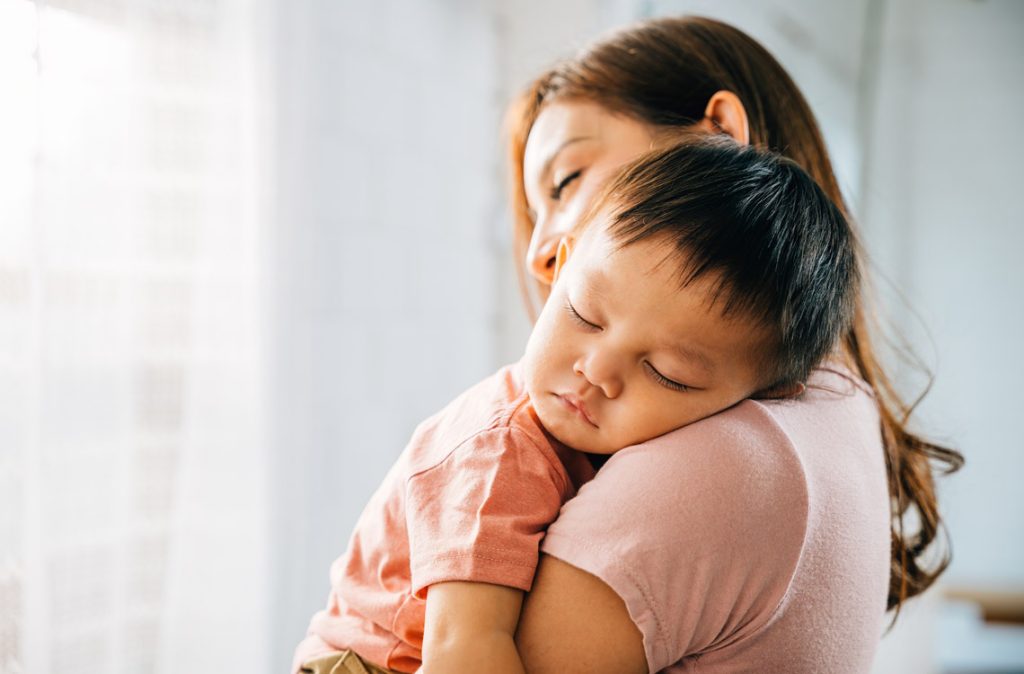If you’re a parent with a small child or baby, you already know that cuddling feels good.
But what you might not realise is how much those minutes of skin-to-skin, lap time or bedtime cuddles are quietly doing for your family’s health (and not just for your little one).
Cuddling with your partner brings its own set of benefits too.
Below are five surprising, evidence-backed reasons to make hugs and touch a bigger part of your daily life.
The Ultimate Stress Reliever
There’s real science behind that “ahh” feeling after you hold your child or partner.
Gentle touch and short embraces trigger the release of oxytocin and serotonin, hormones that calm the nervous system and lower cortisol levels, the body’s main stress hormone.
In simple terms, cuddling acts like a natural tranquilliser.
Some parents often live in a constant state of “go-go-go”. A quick cuddle before the morning chaos or after a long day can help your body recover from tension and fatigue.
Research has shown that affectionate physical contact reduces stress markers and improves overall wellbeing, making it a simple yet effective way to regulate mood and energy.
A Health Booster
Here’s a stat every germ-wary parent will appreciate: people who receive frequent hugs are less likely to catch a cold, and when they do, their symptoms are milder.
A 2015 study found that regular hugs can protect against stress-related infections and boost immune resilience.
Hugs act as a kind of emotional buffer.
When you’re less stressed, your immune system functions more efficiently.
The same applies to your children; calm, securely attached kids tend to have fewer stress-related health issues.
So the next time your toddler wants “just one more hug”, think of it as part of the family’s wellness plan.
Optimises Bonding Time
Cuddling is more than comfort; it’s chemistry. When you cuddle your baby, your body releases oxytocin, also known as the “love hormone”. The same process happens when you cuddle your partner.
Research on oxytocin shows it promotes emotional bonding, trust, and a sense of security.
For couples, this translates into a stronger relationship and better communication.
A simple hug after an argument can help regulate emotions and rebuild connection faster than words sometimes can.
For new parents who may feel distant due to exhaustion or stress, regular cuddles can re-establish intimacy and remind both partners they’re on the same team.
A Natural Painkiller
It’s not just babies who benefit from gentle touch. In newborns, cuddling helps reduce distress, stabilises heart rate, and lowers pain perception during medical procedures.
Adults, too, experience similar effects: oxytocin and endorphins released through cuddling can reduce pain sensitivity and tension headaches.
Cuddling before bed also helps your body release melatonin, the hormone that regulates sleep.
A few minutes of snuggling, with your baby in your arms or your partner beside you, can improve sleep quality for everyone.
For parents who often run on broken rest, that’s a small but meaningful advantage.
Emotional Regulation
Nurturing touch teaches babies that the world is predictable and safe. Over time, that sense of safety translates into better emotional regulation, stronger social skills, and greater resilience.
Studies on early skin-to-skin and “kangaroo care” show that these effects can last into childhood, supporting better emotional development and parent–child bonding.
But cuddling benefits parents emotionally too.
It lowers anxiety, increases empathy, and even reduces symptoms of depression.
Couples who maintain physical affection report greater relationship satisfaction and lower stress.
These are key ingredients for maintaining patience and warmth in parenting.
Practical Tips for Busy Parents
- Make cuddles part of your routine. Morning snuggles, pre-nap hugs, or a short skin-to-skin moment while having your tea all count.
- Share the touch. Alternate between cuddling your baby and taking turns with your partner — even brief embraces between nappy changes make a difference.
- Try baby-wearing. It keeps your little one close while freeing up your hands (and heart) for your partner.
- Reignite couple connection. End the day with a hug or quiet moment together — not a scroll through your phones.
- Remember safety. Always follow safe-sleep guidelines for babies and practise skin-to-skin while awake and alert.
The Warmest Medicine
Cuddling is one of the simplest, most powerful health tools available to families.
It lowers stress, boosts immunity, deepens relationships, relieves pain, improves sleep, and builds emotional resilience.
For parents, it’s a way to slow down, reconnect, and strengthen both your child’s wellbeing and your own relationship.
So the next time your toddler clings to your leg or your partner leans in for a hug, don’t rush away. Those few seconds of closeness might just be the best medicine everyone needs.
Disclaimer: The information provided in this article is for informational purposes only and should not be considered as medical advice from Motherhood. For any health-related concerns, it is advisable to consult with a qualified healthcare professional or medical practitioner.
For more insightful stories and parenting advice, stay tuned to Motherhood.Sg!
